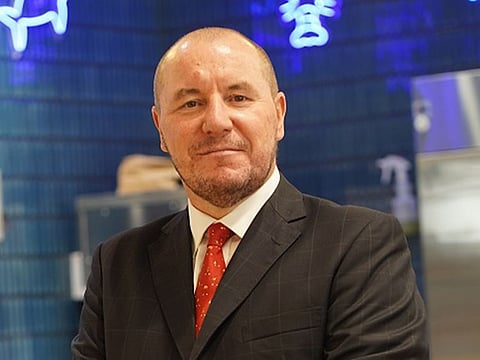UAE retailers should not think sustainability as ‘eating into profits’, says Grandiose Supermarkets CEO
Grandiose CEO James Scott gets ready for e-bikes and more in one big green push

Dubai: Paying 25 fils for single-use plastic bags is the most obvious do-good deed at retail outlets in the UAE. But for the vast majority of retailers, that switch came because the UAE authorities mandated that they do.
That’s not the case for James Scott and Grandiose Supermarkets, which implemented the no-plastic bag policy in 2017. And it didn’t end there, because the retailer has stitched together a series of sustainability-focused processes and expects its customers to get on the same journey.
So, what does that mean? Making shopping carts out of recycled plastic netted from the oceans. Using lighting systems at the stores that reduce energy consumption and the carbon footprint. And there’s more coming.
Scott, who’s the CEO of Grandiose Supermarkets (part of Ghassan Aboud Group), says that going green helps on many fronts, including win customers. And that the chain will keep on doing so, whatever the cost might be.
Given the extreme low margin high volume nature of supermarket operations, aren’t there limits to what can be attempted on sustainability?
While the strategy of low margin high value continues to dictate the functioning of a supermarket, price is not the only purchase criterion and margins are not the only success markers. More than ever, the UAE public is becoming increasingly conscious of the environment.
A stunning percentage – 31 per cent each - of Gen Z and millennials are willing to pay a premium for brands that demonstrate sustainable behavior. The MENA public is more cognizant of their individual carbon footprint. This naturally lays an important ecological framework within which retailers should operate to stay ahead of the evolving times.
As per research commissioned by Mastercard, nearly three quarters of adults in the UAE expect businesses to be environmentally-friendly. These expectations are not ones to be dismissed since over a quarter would even go to the extent of switching or possibly boycotting businesses that exhibit no promise to ecologize business operations.
Whilst from the outset it may seem that sustainability can eat into profits, its absence can potentially eat away the entire business.
Supermarket operators have already made the switch to removing single use plastic covers for charging 25 fils. Won’t that constitute a sizable cost to operations?
As a grocery retailer that has not been using plastic bags at checkout since its inception back in 2017, the (new UAE) mandate did not have a radical effect on our operational cost. That said, championing sustainability does translate to a heavy financial outlay, which can be viewed as an expense or an investment, depending on the firm’s approach.
Considering the widespread expansion plans that Grandiose has in store for the rest of the year, we’ve managed to absorb the cost or should we say, earned a long term asset of goodwill to achieve economic success through ecological measures.
Have your supermarket traffic numbers dropped in the aftermath of the 25 fil charge?
Since Grandiose Supermarket has always been plastic bags free, our customer base did not feel any difference since the implementation of the mandate. For customers at large, the problem area is not the charge of 25 fils but the initial block to remember to carry a reusable bag before a regular shopping run.
What are the other sustainability initiatives you’ve taken? Are these at select locations for now?
Grandiose advanced the momentum by utilizing recycled ocean plastic to manufacture a sustainable range of shopping trolleys. So far, we have saved more than 15 million plastic bags since the brand’s inception as well as over 100,000 marine animals.
Energy-saving lighting, efficient refrigeration, and streamlined operational logistics by sourcing and supporting locally grown products are some of the aspects of our business that we keep improving to further reduce the carbon footprint. This is just the beginning of Grandiose Supermarket’s sustainability plans.
What’s coming?
It was the region’s high energy requirement for cooling, comprising roughly 70 per cent of the nation’s electricity consumption, that inspired us to employ energy-efficient store fit-outs, refrigeration, and cold storage.
We then focused on the rising dependence on the region’s food imports prioritizing the procurement of locally grown products. Next is a move to address the nation’s rising fuel consumption. Grandiose will add energy-efficient bikes to our online delivery fleet to reduce emissions and transition from a van delivery fleet to a motorbikes delivery fleet.
How about new store locations?
Grandiose already has its presence in Dubai, Abu Dhabi, and Ras Al Khaimah, with plans to open 12 new stores this year and take our total to 30. As we plan to open 15-20 new stores every year in the short/medium term, we are focused on being the No. 1 neighbourhood supermarket with a clear focus on freshness and quality.
Any plans to enter omni-channel or tie up with a partner on Q-commerce?
Grandiose Supermarket already has its own ecommerce channels, and where we have been using only paper bags for online deliveries.
Sign up for the Daily Briefing
Get the latest news and updates straight to your inbox



